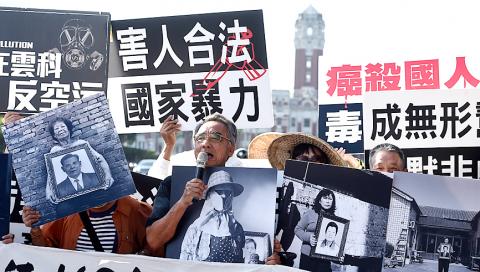Residents of Changhua and Yunlin counties yesterday gathered in front of the Presidential Office Buiilding to petition the central government to authorize local governments to legislate bylaws to regulate coal burning to curb air pollution.
Holding placards and photographs of deceased family members, dozens of people shouted: “No more obstruction to coal burning ban” and “shut down the [Mailiao] naphtha cracker by 2020” and “people have the right to clean air.”
The Yunlin County Government announced a ban on the burning of petroleum coke and coal in June, following an oath-taking in April by government heads of Yunlin and Chiayi counties and Chiayi, Tainan, Taichung and Chunghua cities in April to phase out petroleum coke and coal to fight air pollution.

Photo: Lo Pei-der, Taipei Times
The Environmental Protection Administration (EPA) in September rejected the ban, saying that it involved national energy policies and regulations that fall within the jurisdiction of the central government, according to the Energy Administration Act (能源管理法) and the Local Government Act (地方制度法).
Changhua resident Chiang Shang-chien (江尚謙) said of the EPA’s rejection of the Yunlin ban: “Either local governments do not exercise the legal weapons they have, or the central governments offsets local governments’ attempts to combat air pollution.”
Hwang Yuan-her (黃源河) a Mingdao University professor and resident of Taixi Township (台西) in Yunlin, said that Singapore has banned petroleum coke from its oil refinery industry, adding that developed countries are phasing out fuels that cause high emissions.
She said she would urge the government to follow suit and clamp down on polluting industries.
Meanwhile, campaigners said that the Formosa Plastics Group’s naphtha cracker in Yunlin’s Mailiao Township (麥寮) is one of the nation’s largest contributors of PM2.5 pollution — airborne particles measuring 2.5 micrometers or less — and volatile organic compounds (VOCs), possibly increasing the incidence of cancer among local residents.
National Yunlin University of Science and Technology chemistry professor Lin Chuen-chang (林春強) said that VOCs pose a higher health risk than PM2.5 and could cause a variety of cancers, adding that Yunlin and Changhua residents absorb 10 times more VOCs than people living in Taipei.
A Yunlin bylaw to regulate VOCs emissions was submitted to the EPA for approval in March, but the EPA has yet to review it, Lin said, calling for the EPA to promptly pass the bylaw.
“The government allows businesses to discharge carcinogenic pollutants if they pay taxes, which would be tantamount to legalizing murder. Taiwan would become a ‘ghost island’ if the government continues to ignore air pollution issues,” Yunlin resident Wu Jih-hui (吳日輝) said.
Protesters demanded that the government make public all the pollution monitoring data of the naphtha cracker, include local residents and environmental groups in the supervision committee of the cracker complex and refrain from blocking bylaws that ban burning of petroleum coke and coal.

A preclearance service to facilitate entry for people traveling to select airports in Japan would be available from Thursday next week to Feb. 25 at Taiwan Taoyuan International Airport, Taoyuan International Airport Corp (TIAC) said on Tuesday. The service was first made available to Taiwanese travelers throughout the winter vacation of 2024 and during the Lunar New Year holiday. In addition to flights to the Japanese cities of Hakodate, Asahikawa, Akita, Sendai, Niigata, Okayama, Takamatsu, Kumamoto and Kagoshima, the service would be available to travelers to Kobe and Oita. The service can be accessed by passengers of 15 flight routes operated by

GIVE AND TAKE: Blood demand continues to rise each year, while fewer young donors are available due to the nation’s falling birthrate, a doctor said Blood donors can redeem points earned from donations to obtain limited edition Formosan black bear travel mugs, the Kaohsiung Blood Center said yesterday, as it announced a goal of stocking 20,000 units of blood prior to the Lunar New Year. The last month of the lunar year is National Blood Donation Month, when local centers seek to stockpile blood for use during the Lunar New Year holiday. The blood demand in southern Taiwan — including Tainan and Kaohsiung, as well as Chiayi, Pingtung, Penghu and Taitung counties — is about 2,000 units per day, the center said. The donation campaign aims to boost

ENHANCING EFFICIENCY: The apron can accommodate 16 airplanes overnight at Taoyuan airport while work on the third runway continues, the transport minister said A new temporary overnight parking apron at Taiwan Taoyuan International Airport is to start operating on Friday next week to boost operational efficiency while the third runway is being constructed, the Ministry of Transportation and Communications said yesterday. The apron — one of the crucial projects in the construction of the third runway — can accommodate 16 aircraft overnight at the nation’s largest international airport, Minister of Transportation and Communications Chen Shih-kai (陳世凱) told reporters while inspecting the new facility yesterday morning. Aside from providing the airport operator with greater flexibility in aircraft parking during the third runway construction,

American climber Alex Honnold is to attempt a free climb of Taipei 101 today at 9am, with traffic closures around the skyscraper. To accommodate the climb attempt and filming, the Taipei Department of Transportation said traffic controls would be enforced around the Taipei 101 area. If weather conditions delay the climb, the restrictions would be pushed back to tomorrow. Traffic controls would be in place today from 7am to 11am around the Taipei 101 area, the department said. Songzhi Road would be fully closed in both directions between Songlian Road and Xinyi Road Sec 5, it said, adding that bidirectional traffic controls would